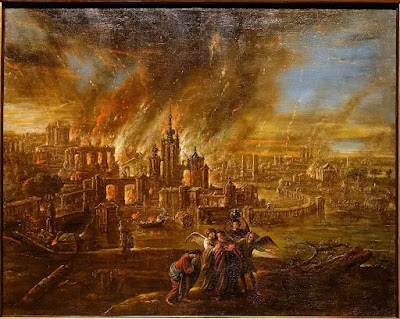Sodom and Gomorrah afire, painting by Jacob de Wet II, 1680
The Church Calls All Men to Salvation
“Woe to you that call evil good, and good evil: that put darkness for light, and light for darkness: that put bitter for sweet, and sweet for bitter” (Isaias 5:20).
In a seeming reversal of its 2021 prohibition against blessing any same sex couples, the Vatican’s December publication of Fiducia supplicans allegedly opened the door for priests to bless same sex couples. Bree A. Dail writes:
The new Prefect of the Doctrine of the Faith states people in “irregular” unions, such as same sex unions, may NOT receive anything resembling liturgical blessings, or blessings of their unions. They may, however, receive spontaneous blessing, limited to “the invocation of a blessing that descends from God upon those who recognizing themselves to be destitute and in need of his help do not claim a legitimation of their own status, but who beg that all that is true, good, and humanly valid in their lives and their relationships be enriched, healed, and elevated by the presence of the Holy Spirit. These forms of blessing express a supplication that God may grant those aids that come from the impulses of his Spirit what classical theology calls ‘actual grace’ —so that human relationships may mature and grow in fidelity to the Gospel, that they may be freed from their imperfections and frailties, and that they may express themselves in the ever-increasing dimension of the divine love.”
Yet, in this latest ordeal, disorder and confusion have been sowed. News headlines announced: “Pope Francis officially approved allowing priests to perform blessings on same-sex couples as long as the ritual does not resemble marriage. » Those who had same-sex attraction could previously ask for blessings like anyone else who struggles with any number of sins. What this document has done is change the optics of the Church to apparently soften its stance against “gay marriage.”
While anyone may ask for a blessing, the blessing of two individuals in a known arrangement against the 6th Commandment cannot be permitted. It is as nonsensical as asking a priest to bless the building in which Planned Parenthood was killing children while stating that the blessing was just on the building and not on the evil done there. Or it would be as ludicrous as blessing the members of a KKK chapter while stating that it was just an individual blessing and did not mean anything regarding the activities the men came together to do. The blessing of two people who are regularly and publicly engaging in sodomy can not be blessed without blessing the underlying “union.”
Is the new document scandalous? Will it lead to the loss of souls? Is it an attempt to normalize things with secular culture? Should it be opposed? Yes, to all of these. But did it change Church teaching? No, since Catholic dogma cannot change.
The 6th Commandment Recap
The sixth Commandment condemns incest (sexual relations with a relative or in-law), fornication (sexual relations with someone of the opposite sex when neither of is in the state of marriage), homosexual relations (sexual activity with someone of the same sex), masturbation (the stimulation of one’s own sexual organs for pleasure), rape, and other similar offenses. Prostitution, artificial insemination, pornography, seducing others, sexually abusing children, dressing immodestly, reading impure literature, listening to impure jokes, songs, or movies, or using artificial contraception are likewise all condemned.
Divine Law, as stated in the Commandments, does not and change not change. Should anyone try to argue that the Scriptures themselves do not discuss homosexual activity, he should read Leviticus 18:22, which states: « Thou shalt not lie with mankind as with womankind, because it is an abomination.”
The Church Does Not Hate Those with Same-Sex Attraction (SSA)
It is often a scapegoat in our culture that the Church hates anyone who has or has ever experienced same-sex attraction. This is false. The Church does not condemn being homosexual since some people may not be able to help their sexual orientation. What the Church forbids is homosexual activity, which is engaging in sexual acts with a person of the same sex. It is technically impossible for two people of the same sex to marry since marriage is between one man and one woman for the purpose of raising children.
Those who do experience SSA should consult the resources of Courage. Courage members are men and women who experience same-sex attractions and who have made a commitment to strive for chastity and to conform their lives to the actual and unchangeable teachings of the Catholic Church.
The Church’s Laws on Marriage
The Church likewise condemns forced marriages against a person’s will, marriages solemnized in front of non-Catholic ministers, and adulterous “second” marriages when a person’s spouse is still living since divorce is not possible.
Canon law does not prohibit Catholics from attending invalid weddings for non-Catholics but Catholics must discern if their attendance at such weddings would be a cause for scandal. And we must also think what we can do – if anything – to help that person know the Catholic Faith. It is clearer that it is not permitted to attend the wedding of a Catholic who marries outside of the Church. Likewise, it would not be appropriate to attend the alleged marriage of any same-sex couple since it is not a valid marriage, and one’s presence will undoubtedly cause scandal by seemingly approving of the event.
Let Us Invoke St. Charles Lwanga and His Companions
St. Charles Lwanga was born in 1865 in Bulimu, Buganda, Uganda. He was a servant of King Mwanga of Uganda. In 1885, he converted to Catholicism, and for that, he was burned to death in 1886 at Namugongo, Uganda, because they refused to give in to the homosexual demands of King Mwanga. Yet, St. Charles did not scream in pain as he burned to death. He even helped arrange the sticks for the fire and said he was pleased to die for the True Faith.
St. Charles Lwanga is one of 22 people that we remember for dying for their faith in Uganda. May he intercede for all who struggle with SSA, and through his prayers, may all those who foster sin and confusion cease their errors at once.




